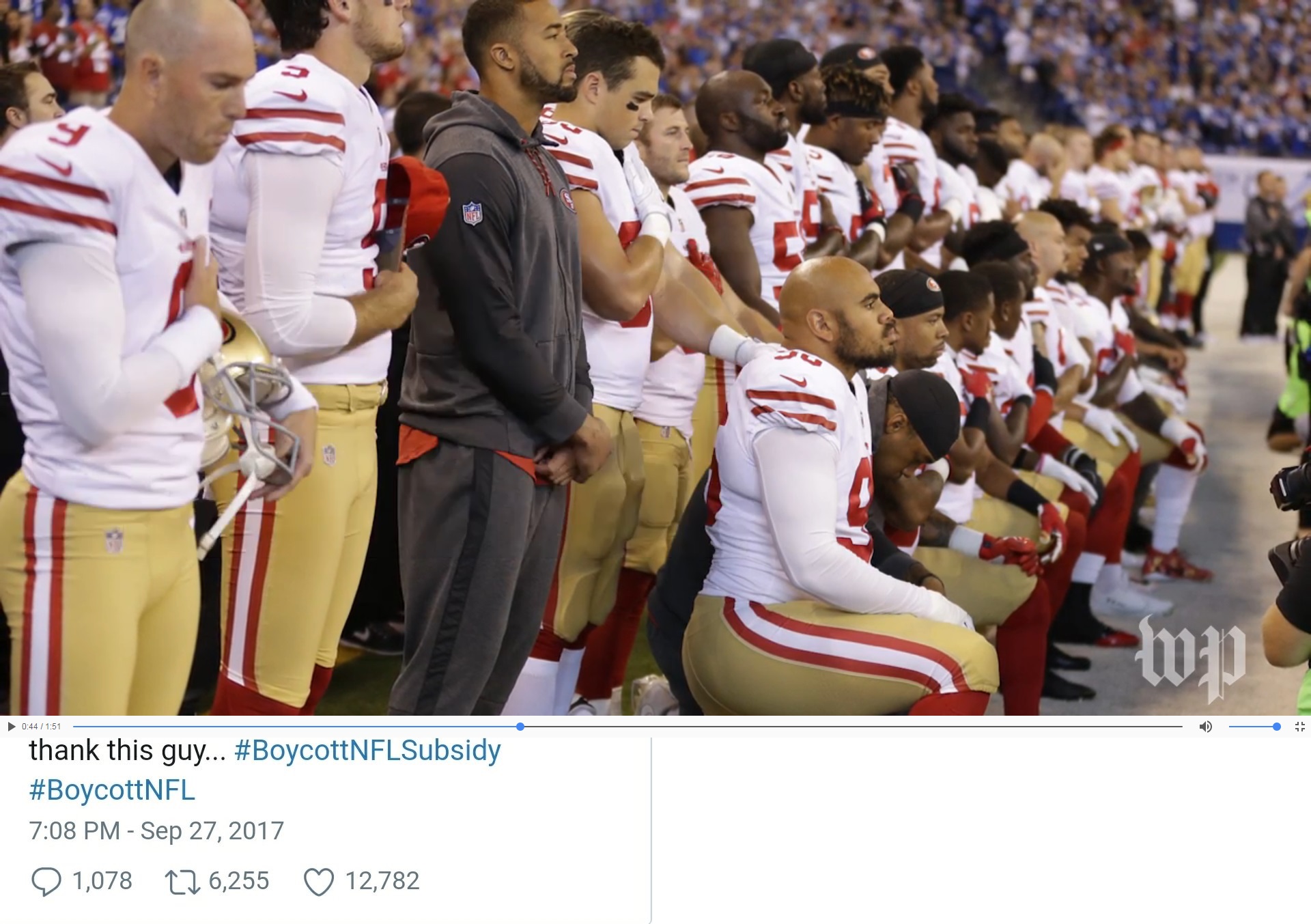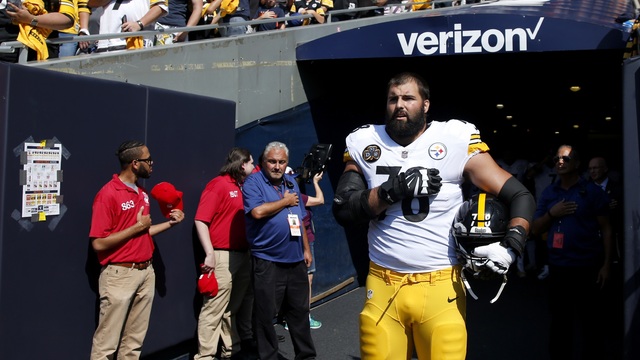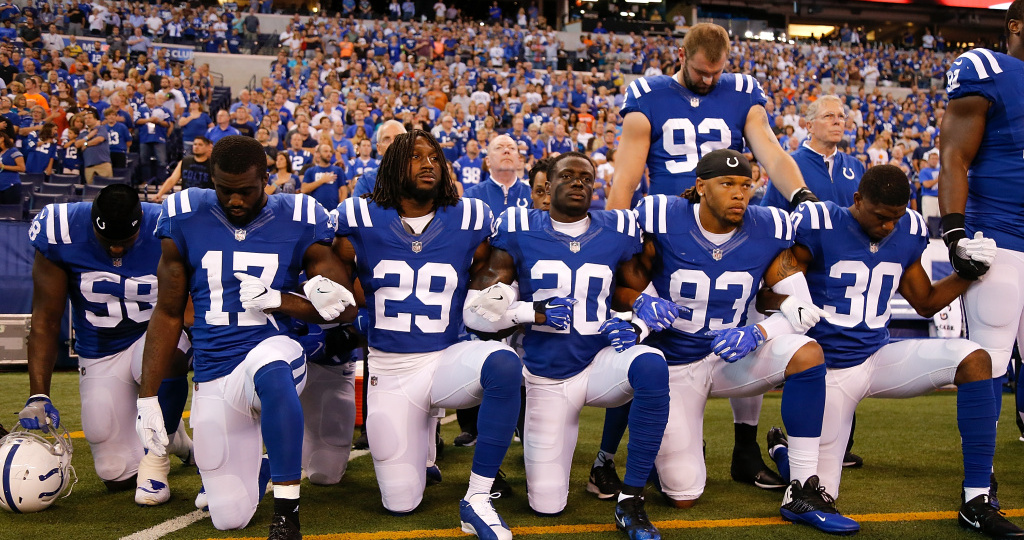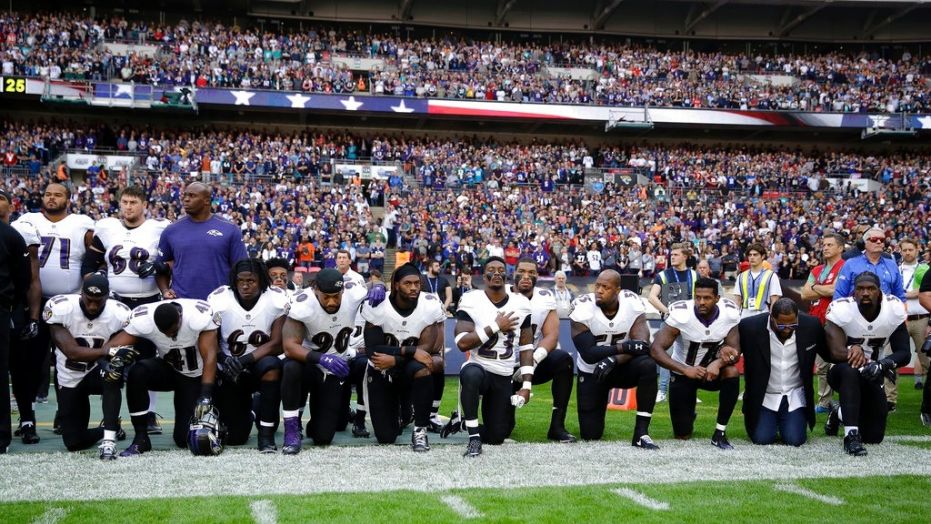VIDEO: VP Mike Pence walked out of Indy stadium after several 49er players knelt during the anthem

The NFL, team owners, and players still don’t get it!
The plan had been for Vice President Mike Pence to attend the Indianapolis Colts game at which Peyton Manning’s number was to be retired, a gala celebration of the former Colts quarterback’s contributions to Pence’s home state, according to The Washington Post.
The former governor of Indiana and his wife, wearing a Manning No. 18 jersey, left Lucas Oil Stadium after the national anthem, following instructions from President Trump after a number of San Francisco 49ers players, as they usually do, took a knee during the anthem.
“I asked @VP Pence to leave stadium if any players kneeled,” Trump posted on Twitter. “I am proud of him and @SecondLady Karen.”
I asked @VP Pence to leave stadium if any players kneeled, disrespecting our country. I am proud of him and @SecondLady Karen.
— Donald J. Trump (@realDonaldTrump) October 8, 2017
Pence said he chose to leave because “we should rally around our Flag.”
“I left today’s Colts game because President Trump and I will not dignify any event that disrespects our soldiers, our Flag, or our National Anthem. At a time when so many Americans are inspiring our nation with their courage, resolve, and resilience, now, more than ever, we should rally around our Flag and everything that unites us,” he said in a statement. “While everyone is entitled to their own opinions, I don’t think it’s too much to ask NFL players to respect the Flag and our National Anthem. I stand with President Trump, I stand with our soldiers, and I will always stand for our Flag and our National Anthem.”
Pence left after more than a dozen members of the 49ers took a knee during the anthem, as many NFL players have done to raise awareness of social injustice and racial inequality. Members of the Colts stood for the anthem with arms linked.
I count 23 member of the #49ers kneeling for the playing of the national anthem as a protest of social inequality.
— Matt Maiocco (@MaioccoNBCS) October 8, 2017
Looks as if 15 49ers are kneeling for anthem. VP Mike Pence attending game. … pic.twitter.com/FWtO512KFK
— Matt Barrows (@mattbarrows) October 8, 2017
Although players have stressed that the demonstrations are not meant to disparage military members of the anthem, Pence’s departure revives the story of player demonstrations during the anthem.
Critics called it a political stunt carried out at taxpayers’ expense.
Pence’s media schedule for Sunday showed him attending the Colts game from 1-4 p.m. Eastern. But given Trump’s instructions, an early departure seemed likely because at least one member of the 49ers has protested during the national anthem at every game this season, a practice that originated with the team in 2016. Protests by the 49ers, and from players across the NFL, intensified after Trump called upon league owners to fire or suspend players who did not stand for the anthem last month.
NBC’s Vaughn Hillyard reported from Indianapolis that the media pool was kept in vans ahead of the game instead of being led inside with Pence. A staffer told the pool there was a chance Pence may depart early, but did not mention how early.
As media pool has been made aware, a staffer told pool that VPOTUS may depart the game early. Did not indicate how early. https://t.co/G1f2WljJAW
— Vaughn Hillyard (@VaughnHillyard) October 8, 2017
The media pool was kept in the vans ahead of the game instead of being led in with VPOTUS. https://t.co/NXIFZCp3fb
— Vaughn Hillyard (@VaughnHillyard) October 8, 2017
Pence’s office did not answer a request for comment on the price and purpose of the trip. It costs the federal government about $43,000 an hour to fly Air Force Two, according to a 2012 estimate by the Air Force. Assuming a total flight time of six hours for the journey east and then west again, the tab for the flight alone would have topped $250,000.
That only accounts for some of the expense. Sam Myers Sr., who spent eight years as then-Vice President Joe Biden’s trip director, estimated Pence’s entourage likely included some 50 staffers. But, he said, “the support when the principal hits the ground is when the costs kick in,” pointing to Secret Service agents deployed from the local field office; police to provide security along the motorcade route and at the perimeter of the event; an ambulance for the motorcade; and extra trauma teams on hand at a local hospital, among others — with many earning overtime wages for working on a Sunday.
The Trump administration’s travel expenditures are facing new scrutiny following revelations that cabinet members have made heavy use of private jets. Former Health and Human Services secretary Tom Price racked up an estimated million dollars in expenses on such trips, forcing his resignation last last month. A Treasury Department review of Secretary Steven Mnuchin’s $811,000 in military flights found they were legal but poorly justified. In a memo clarifying the administration’s travel policy following Price’s exit, White House budget director Mick Mulvaney wrote that “just because something is legal doesn’t make it right.”
Throughout the five weeks of this season, players have taken a knee. They have linked arms. Some have raised a defiant fist to the sky in the face of presidential directives to the owners of their teams to fire or suspend them. And as their season settles into the critical second quarter, they have sought to pivot toward taking positive action and refining their message.

Member of the San Francisco 49ers kneel during the playing of the national anthem before an NFL football game against the Indianapolis Colts, Sunday. (Michael Conroy/Associated Press)
“My honest reaction … Does anybody know the last time he’s been to a football game?” 49ers safety Eric Reid said, in a postgame video from Jennifer Lee Chan of Niners Nation. Reid has protested during the anthem of over a year, first taking a knee with Kaepernick a season ago.
“So this looks like a PR stunt to me,” Reid continued. “He knew our team has had the most players protest. He knew that we were probably going to do it again. This is what systemic oppression looks like. A man with power comes to the game, tweets a couple of things out and leaves the game with an attempt to thwart our efforts. Based on the information I have, that’s the assumption I’ve made.”
Away from Indianapolis, other players around the league, like Olivier Vernon of the New York Giants, continued to kneel Sunday, but most stood and linked arms as many have acknowledged that that their message was becoming misinterpreted, co-opted by some who were claiming it was aimed at military members rather than police brutality toward minorities. In Miami, three members of the Dolphins who have protested for over a year chose to stay off the field as Michael Thomas, Kenny Stills and Julius Thomas remained in the tunnel. Earlier, owner Stephen Ross had said, “I think it’s incumbent upon the players today, because of how the public is looking at it, is to stand and salute the flag.”
Players last month took the extraordinary step of urging Commissioner Roger Goodell to designate a month to raise awareness, part of a new approach over the last few weeks, partly because they were hearing boos from fans during the anthem. In Green Bay, players heard it loud and clear late last month after asking fans to join them in linking arms.
“Beauty is, it’s a free country so they can choose to do it or not. The messaging towards this unfortunately needs to continue to be redirected, I think. It’s never been about the national anthem. It’s never been about the military.” quarterback Aaron Rodgers said. “We’re all patriotic in the locker room. We love our troops. This is about something bigger than that — an invitation to show unity in the face of some divisiveness from the top in this country and I’m proud of our guys.”
The message was muddled over the first month of the season with Trump calling for NFL owners to suspend or fire players who took a knee for the anthem, calling any who do, in a veiled reference to Kaepernick, a “son of a bitch.” A false, Photoshopped image of the Seattle Seahawks’ Michael Bennett burning a flag in the locker room became a widely shared meme designed to stir up passions. The Seahawks took the next step in their activism, announcing the creation of an educational fund.
“In an effort to create lasting change and build a more compassionate and inclusive society, we are launching the Seahawks Players Equality & Justice for All Action Fund to support education and leadership programs addressing equality and justice,” the team tweeted Sept. 29. “We invite you to join us in donating and taking action.”
The efforts may not have led to results that are more conversational than nationally tangible, but the players pledge that their activism will not end and it’s likely to become an issue again now. In their memo to Goodell, Bennett, the Philadelphia Eagles’ Torrey Smith and Malcolm Jenkins and retired player Anquan Boldin requested that the NFL designate a month, as it does for Breast Cancer awareness in October, to highlight player activism and community engagement.
“To counter the vast amount of press attention being referred to as the ‘national anthem protests’ versus the large amount of grass roots work that many players around the league have invested their time and resources, we would like to request a league wide initiative that would include a month dedicated to a campaign initiative and related events,” the memo stated. “Similarly to what the league already implements for breast cancer awareness, honoring military, etc., we would like November to serve as a month of Unity for individual teams to engage and impact the community in their market.”





